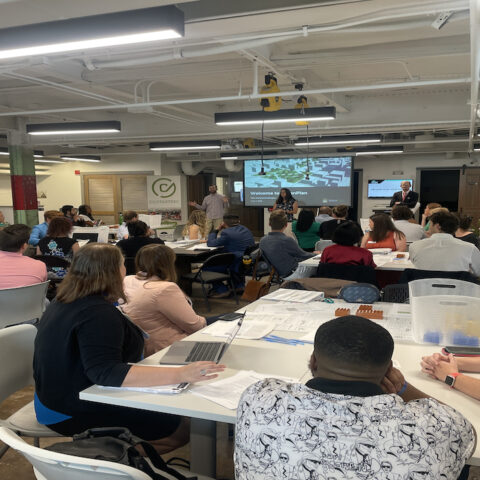Top Story
Nominate a woman who inspires you for recognition!
The Leaders has grown to a list of women that are 70 strong, and we are now looking for nominations for our 2023 cohort.

Key Takeaways from UrbanPlan Columbus
On June 7th, ULI Atlanta and some of its members traveled to Columbus, GA to execute a new partnership with Georgia Forward’s Young Gamechangers program – which convenes 50 young leaders from around the State of Georgia to develop a community and economic development action plan that addresses a variety of challenges the host community faces.
ULI Atlanta was brought in specifically to facilitate UrbanPlan which is a simulated exercise that helps to educate and shape development in our local communities including what trade-offs have to be made to ensure development happens. UrbanPlan uses a hypothetical city RFP scenario where teams act as a real-life development team to manage site planning, financials, community concerns, and required ROI guidelines to put together a detailed proposal which they would defend in front of a mock city council. Watch the UrbanPlan video here. In the process, teams learn from a bird’s eye view how this complex and coordinated process can effectively work with other pieces of the puzzle to provide productive solutions to challenging community development needs through the UrbanPlan framework.
The Impact of a Vision Statement
Creating a vision statement was the first step in the UrbanPlan process. This step builds a foundation on which important design components are based on. In this stage many teams were introduced to common industry issues such as how important or not preservation of existing buildings would be, what aspirations they had for the community, and what they wanted to see in a community through the lens of this project.
The Effect of Tradeoffs
When it came time for the project teams to put their vision to reality – they quickly learned the economic tradeoffs associated with their decision making. Putting to the test in determining the feasibility of their vision as amenable and realistic. While only one team member oversaw site planning, all team members played a significant role in what decisions went into individual building developments.
This idea of tradeoffs sent some groups into debates about the role cities and communities play in serving individuals across the socioeconomic spectrum including how they serve the most vulnerable communities. Through the process, they had to find a balance between their own altruism versus market reality. This battle between the greater good of the community and meeting financial responsibilities became an overarching message of the day to the Young Gamechangers and a wake-up call on the harsh reality developers and city officials face.
The Importance of Communication
By the end of the facilitated portion of the exercise, teams had meshed out their concerns by creating open dialogue amongst team members and understanding that all aspects of the development site were equally important in the overall success of the project, and the fictional city of Elmwood.
From here, groups were tasked with a 3-minute presentation of their design and development choices and how they defended those projects to meet required goals around housing affordability and sustainability, while also creating an ROI for the city.
Following the exercise, ULI opened the floor to discussion about both the experience and real-world application. Many participants shared questions about how they could find specific information and context, such as that provided in the activity, to which all were met with seemingly the same reply: communication. The participants through this conversation learned that only by bridging the gap of communication between city officials, community leaders, and developers can real estate development provide effective solutions to everyday development challenges. All issues ranging from building a net zero community to saving a skatepark require coordination between all aspects of private and public sector along with a willingness to work with one another. Only then, can we create change for the better.
Don’t have an account? Sign up for a ULI guest account.